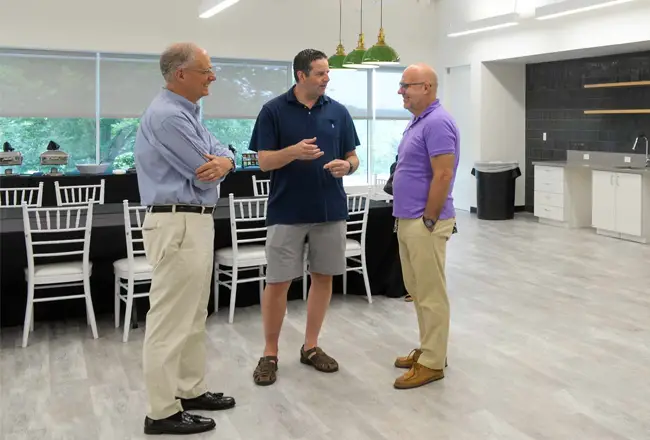
Story Copyright Westfair Communications
The coworking concept is continuing apace, with such facilities seemingly opening on a weekly basis. (Serendipity Labs announced a second Fairfield County location to join its Stamford operation).
But the concept is getting a pronounced twist on the campus of Sacred Heart University, where a partnership with Verizon will offer not just room to innovate, but also the opportunity for students to gain experience working with area corporations.
“We wanted to get both students and faculty out of the silos they can sometimes find themselves in, and work together and with outside companies in a business-centered, innovative hub,” said Tolga Kaya, director of engineering and associate professor of computer engineering at the Fairfield school. “And this isn”™t designed only for business majors ”” we expect students in technology, health care, nursing and others as well.”
Opening in time for the fall semester, the provisionally named SHU Innovation Hub on SHU”™s West Campus ”” the former General Electric headquarters at 3135 Easton Turnpike ”” will be the company”™s first Connecticut venture and its first to be on a college campus. Other locations include New York City; Cambridge, Massachusetts; Los Angeles; Palo Alto, California; Washington, D.C.; and Singapore.
Danny Klein, senior manager, New Business Incubation at Verizon, said the partnership is “a real win/win situation. We”™re able to provide students with a taste of what working in a real-life work environment is like, and it reflects Sacred Heart”™s expanding focus on technology,” which he said was partly exemplified by its adding “Technology” to the name of the Jack Welch College of Business.
“As a technology company ourselves,” Klein continued, “we”™re very interested in how innovation works and by partnering with SHU we have the ability to tap into that talent.”
Klein said, while Verizon”™s efforts in the coworking field are largely altruistic, “We”™re also looking to evangelize the Verizon brand, and we”™re always interested in talent acquisition.”
The SHU space consists of four separate labs in two buildings: an 8,000-square-foot coworking space; an 11,000-square-foot makerspace; and an augmented/virtual reality lab and artificial intelligence lab, each measuring about 10,000 square feet.
The university will tap faculty and staff to build programming and curricula to connect the innovation community to SHU”™s academic mission, Kaya said. A dedicated SHU project coordinator will help identify, activate and create engagement between the innovation community and SHU”™s faculty, staff, administration and student body.
SHU also will establish a student concierge service that members can use as a resource for making connections with various SHU programs, internships, recruiting, events, speaker sessions, office hours and mentoring. Members will also have fee-based access to the labs and facilities.
While SHU students are expected to make up the bulk of those utilizing the areas, they won”™t be the only ones, according to David Rotbard, vice president, Global Real Estate ”” Workplace Strategy and Experience at Verizon.
“Entrepreneurs and freelancers looking to use the space can apply for membership,” Rotbard said. “This is meant to be a blending together of experiences and talents ”” once we get it active, it will be a very energetic space.”
Companies can also take advantage of the Innovation Hub by offering students internships that overlap with the school year, rather than stand apart.
“This will open up a completely different world for our students,” Kaya said. “Maybe their internships will require 15 hours a week at a company instead of 40 hours.”
Rotbard said the ultimate goal is to bridge the gap between startup and corporation by helping the community workspace build next-level ecosystems for entrepreneurs.
Verizon is providing the technology and services needed to cultivate that growth as part of the vision of Hans Vestberg, who was named CEO about a year ago.
“He has a strong commitment to being closer to the academic environment,” Rotbard said.
Getting buy-in from area companies is the next goal.
“We”™re in conversations with several corporations,” Rotbard said. “Being engaged early with these students will help them down the line. And for the students, it”™ll be like they”™re starting their careers already on third base.”
Connecticut not being Silicon Valley need not preclude it from becoming something similar, Rotbard added.
“(Former Mayor) Rahm Emanuel was able to take Chicago from just being home of The Mart to being a tech hub through deals with Groupon and Google,” he said. “And there”™s just as tremendous an opportunity for Connecticut.”
“This is exactly the kind of innovative and entrepreneurial platform that Connecticut desperately needs, and we”™re delighted to be hosting it on our campus, working collaboratively with Verizon,” said SHU President John J. Petillo. “With Verizon, and the many small and large businesses and organizations that choose to align with our innovation center, we will introduce a new creative working model and rich opportunities for fostering talent, ideas and business growth.”
Fairfield First Selectman Mike Tetreau was equally effusive.
“This is a major boost to Fairfield”™s economic development efforts to bring more jobs and businesses to our town,” he said. “I am very excited about this Sacred Heart University initiative, as it certainly goes a long way to helping replace the loss of GE in our community.”



















